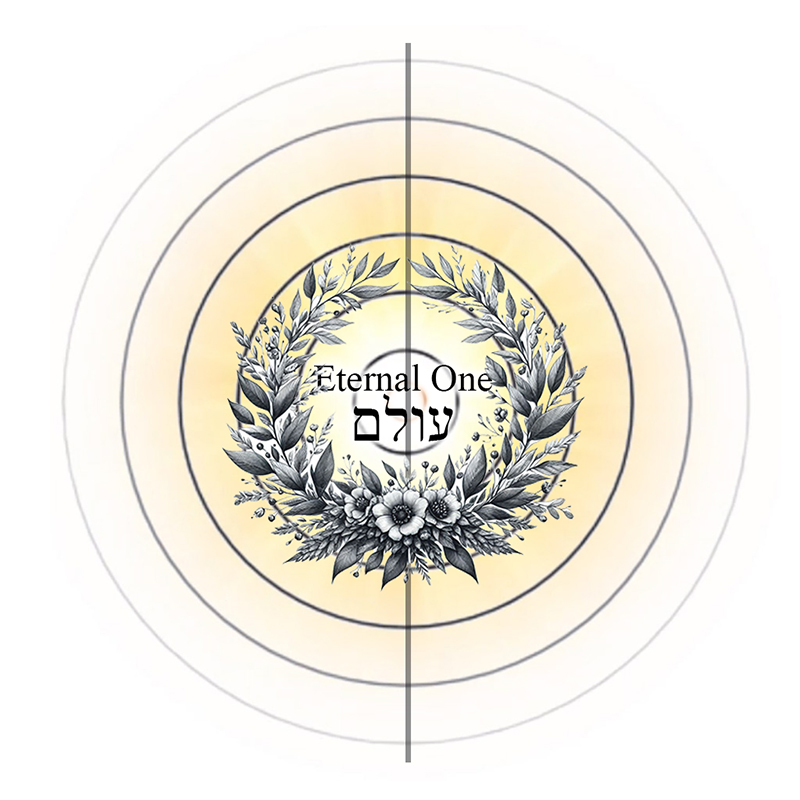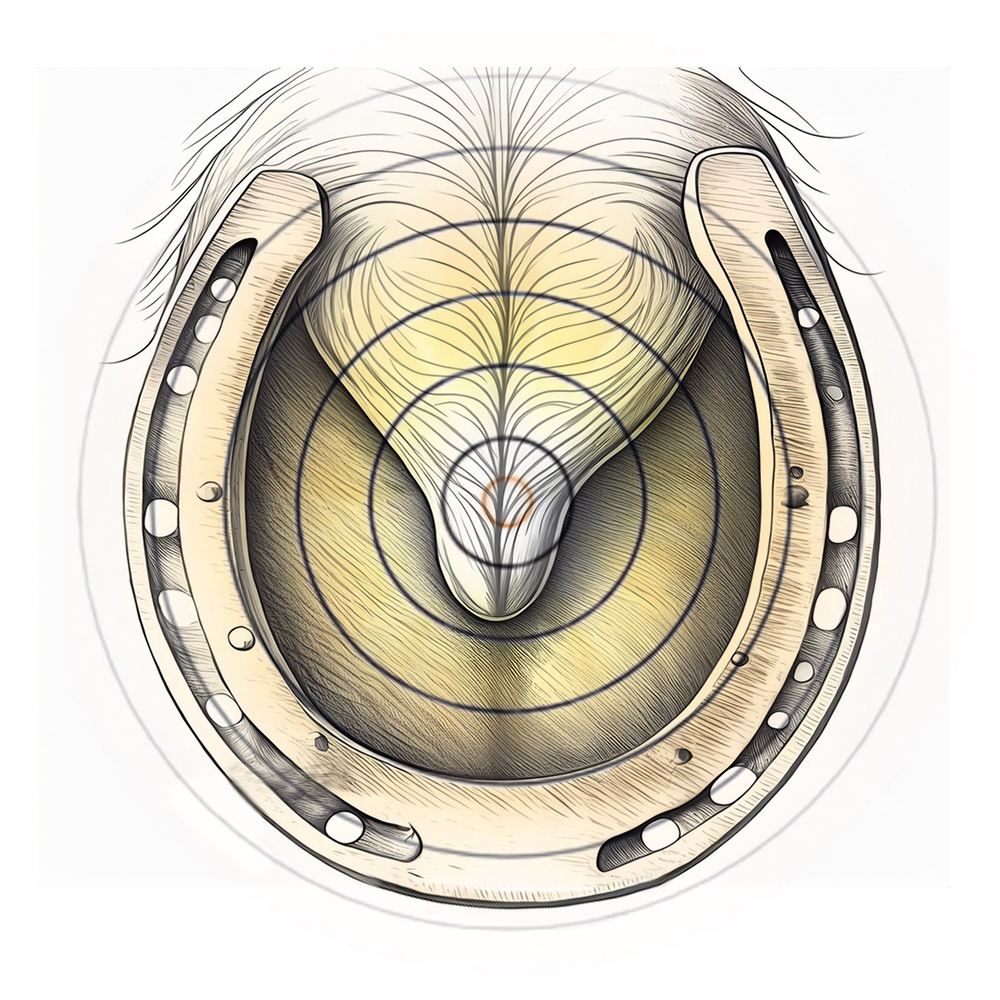He is Favored 1
The Twins within The Writing
The Logos Ratio was being within an origin,1 and the Logos Ratio was being toward the God,2 and the Logos Ratio was being God.3
Movement slows as one draws closer to the Origin, until all is still. The Way to The Sabbaton (Inner) Rest of "timelessness" must be made straight, where motion ceases. The question then is, why twin sons?
Genesis 1:
Within the Head...
He is Evening | He is Morning

The Logos is a self-operating ratio that continuously converts indeterminate multiplicity (chaos/abyss) into determinate structure.
(Read The Architecture of Being: Logos as the Aonic Operator of Ratio and Flesh)The Origin as Self
This one was being within an origin toward the God.4"He who loves the woman of himself, loves himself."
Everyone5 became7 through himself,6 and he has become separate from himself, neither of whom has become one.8
The "Number of Man" vs. the "Number of the Woman." The Whole of herself is seven. Six "days" around the origin of the seventh where the Whole "ceases" to move. This would mean the whole of Himself/the Man is six. She represents the Heart of himself. There was no "whole" until she was "cut out/shaped" as written in Genesis 1:1 - "Within the Head [feminine]..."
The Mother: A Daylight and Dark one
Within himself was a zoe-life,9 and the Zoe-Life, she was being the Daylight of the Humans.And the Daylight is bringing to light10 within the Dark One, and the Dark One, she did not seize self.11
Sent Away from Himself
A man became, he who has been sent away from close beside12 God. A name to self is the Favored.13
He came into a testament, so that he might bear witness around to14 the Daylight, so that all might trust straight across through himself.
That one was not the Daylight, but rather so that he might testify around to the Daylight.15
The True Man
The Daylight was the Real/True one, who is illuminating every man, he who is coming into the Order.Elohim has not known Himself
He was being within the Order, and the Order became across through the other side of himself, and the Order did not recognize Himself.16
- of motion in a line, from one end to the other, right through
- of the interval which has passed between two points of Time.
- διά θαλάσσας across the sea
Into their Own Selves17 he came, yet their Own Selves did not receive from himself.18
A Mother is necessary to Make Children
As many however as took hold of himself,19 he gave to themselves an authority20 to become children of God: the ones who are trusting into the Name of Himself.Begotten of God out of the Origin
Those who, not from out of blood, neither from out of a desire of a flesh, nor from out of a desire of a man, but rather from out of God were fathered.21An only begotten to an only begotten - 1:1
And the Logos Ratio became a flesh and she pitched a tent within ourselves, and we gazed upon the Glory of Himself, a glory as of an only-begotten one23 close beside a father, satiated/fully satisfied of a gracious one and a true one.
The Glory : Himself
Wreathed/Joined Ones (Levite Priests): a man sent out from "himself", to search for "himself."
"And I heard a mega voice from out of the Throne, she who is saying, "Behold! the Tabernacle/Tent of the God in company with the Men! And she will tent in company with themselves!"
(Revelation 21:3 RBT)The First One Genesis 8:7
Favored is testifying around to himself and he has cawed [as a raven],24 he who is saying, "He was this one whom I spoke, The one who is coming hereafter/in the future of myself, has become in front of myself, because he was first of myself."24b
Partakers of the Eternal "Anti" Nature
Because from out of the Completion of Himself, all of ourselves have taken hold, even of a gracious one25 opposite of26 a gracious one.
Because the Usage/Law was given straight across through Drawn-Out ("Moses"),27 the Gracious One and the True One has become straight across through Salvation, an anointed one.28

μονογενὴς Θεὸς - You are Blind from Birth
No one has perceived29 God at any point. A one-of-a-kind God,30 the one who is being into the Fold31 of the Father, that one has led the way out.32
The Cast Seed/Building Stone
And she, herself,33 is being the Testament of the Favored34 when the Casters34a sent away toward himself priests and Joined-Ones,34b from out of Foundations of Peace ("Jerusalems"), that they might ask himself, "Who are you, yourself?"
The Hebrew word לויה (livyah) has the meaning of "something attached" or "a wreath." It is derived from the same root as "Levi" (לוי), the name of the tribe, emphasizing the idea of being "attached" or "joined". A Levite (from above) is one who is eternally united with himself--the first and last becoming one.

ὁμολογέω - Correspond in Word, Same-Speak (the Ratio)
And he spoke the same,35 and he did not deny,36 and he spoke the samethat, "I, I am not the Anointed One."37
A Corner/Angle: Left one, Middle one, Right one.
"The one was, the one who comes, the one who is."

"No, No"
And they questioned himself, "What then, are you, yourself He Is God ("Elijah")?" And he is saying, "I Am Not." "Are you, yourself the Prophet?" And he separated, "No."37bThey said therefore to self, "Who are you, so that we might give a separation/decision to those who have sent ourselves, what are you saying about your own self?"38
And Elohim Heard the Voice of the Boy - Genesis 21:17
He kept bringing to light, "Myself, a voice39 of him who war-cries within the Desolate One,40 "Make straight the Road of a master according to what He Is Liberates Himself ("Isaia-hu") the Prophet spoke!"41
Pharisaiōn - Religious Separatists
And those who were sent away kept being from out of the Separatists.42They speak to their Self - Psalm 43:5
And they questioned himself and said to self, Why then are you plunging44 if you, yourself are not the Anointed One,45 neither God is Himself ("Elija-hu"), neither the Prophet?The Man In the Middle
The Favored separated to themselves, he who is saying, "I, Myself46 am plunging in water. He stands within the middle47 of yourselves, one whom you, yourselves do not see.
axios - Carrying His Weight/Counterbalancing
The one who is coming to the hereafter to myself, of whom I, myself am not counterbalanced to, so that I might untie/loosen the Band of the Sandal of himself."Becoming In the House of Misery, Crossing the Jordan
These became within House of Misery,48 on the other side of the Descending,49 wherever the Favored kept being being him who is plunging/sinking.50
House of Misery vs. House of Wisdom
Coming toward him speaking from tomorrow: Shadow of Miss Offering Lifted Up - Genesis 4:7
On the Tomorrow he is looking at the Salvation, he who is coming toward himself and is saying, "Behold! the Lamb of the God, he who lifts up the Miss of the Mark51 of the Order!"
"If you are not making good, in front of the doorway is the Missing of the Mark/Sin of him who lies stretched out. And toward yourself is the Desire of himself. And your eternal self is comparing within himself."
(Genesis 4:7 RBT)Wheel of Genesis: The Proto of Yourself
He is this one, beyond51b him whom I, myself said, "Hereafter to myself a man is coming,52 he who in front of myself has become, because he was being first (proto) of myself.53
Even I, myself,54 had not been aware of himself. But rather so that he might be made manifest to the God Contends ("Israel") because of this, I, myself have come, he who is plunging within water.
Descending like a Bride
And the Favored testified, he who is speaking that, I have gazed upon the Spirit climbing down as a dove from out of a heavenly one, and she remained upon himself.55

Unaware
Even I, myself had not been aware of himself, but the one who sent myself to plunge within water, that one said to myself, "Upon whosoever you might see the Spirit climbing down and remaining upon himself:He is this one, the one plunging within a spirit, a holy one."Aware
Even I, myself have been aware and have testified that he is this one, the Son of the God."Doubled- He Was always standing firm, Tomorrow
On the Tomorrow the Favored had been standing ready backwards,55b and from out of the Learners of Himself, two.
Standing firm, upright. "Those who walk" are those selves comprehended in chronos time and who can only see what is directly in front of them. Standing firm in the center of the wheel of time means a timeless state, seeing all from beginning to end.
The dual man of heaven is a prophet of himself— he stands firm and walks at the same time, this means he looks at what is directly in front of himself and also at what is coming at the end.
This is what it means to "flatten" the text into completely pointless sayings devoid of any value whatsoever:
"The next day again John was standing with two of his disciples"
(Every other translation)Multiply this flattening methodology by the tens of thousands, and presto, you have a book no can read, or wants to read, or is a truly arduous chore to read, leaving all to vainly hope someone can explain all the nonsense via "spiritual gifting."
And he who looked upon the Salvation, him who is treading all around [in a circuit]56 he is saying, "Behold, the Lamb of the God."

And the two learners heard himself, he who is uttering, and they accompanied the Salvation.57

"The one who holds an ear, let him hear what the Spirit is uttering..." (Rev. 2:7 RBT)
Looking for 'Where'
And the Salvation rotated around and he beheld themselves, those who are accompanying. He is saying to themselves, "Who are you searching for?" And those ones said to self, "My Multiplying One!"58 whosoever is spoken, that which is translated 'Teacher', "Where are you remaining?"From the Night of herself, to the Day of Himself
He is saying to themselves, "Come and you will perceive!" Therefore they came and perceived the Day, that one where he is abiding, and they stayed close beside self. She was an hour just as a tenth.59
"For all of yourselves are sons of Light and sons of Day. We are not of Night, nor of a dark one."
(1 Thess. 5:5 RBT)From Favored to Manly and Hearing Small Stone
Manly60 was the brother of Hearing Small-Stone, one from out of the two of those who have heard from close beside the Favored, and those who have accompanied self.He is finding first the brother of his own self, Hearing, and he is saying to self, "We have found the Anointed One!" whosoever is being translated, "an anointed one".61
He who has beheld himself
He led himself toward the Salvation. He who has gazed on self, the Salvation, he said, "You are Hearing,62 the son of the Favored! You will be called Rock ("Cephas"), which is being translated ‘a small stone’!63His name is Lover of the Horse
In the tomorrow he willed to come out63b into the Land of Circuit ("Galilaia").64 And he is finding Lover of the Horse,65 and the Salvation is saying to self, "Follow myself."
Only horses (and other members of the equine family, such as donkeys and zebras) have a single, large, unsplit hoof on each foot. Hence, the symbolic significance of horses and donkeys.
And the Horse Lover was away from House of Hunting ("Bethsaida"), from out of the city of Manly and Small-Stone.66
His Name is Gift of God
Horse Lover is finding Given of God67 and he is saying to self, "Whosoever Drawn-Out wrote about in the Usage and the Prophets, we have found, the Salvation, son of He Adds,68 the one away from Guarded One ("Nazareth").69Good is Possible
And Given of God said to self, "From out of Guarded One is anyone able to be good?" The Horse Lover is saying to self, "Come and behold!"No Bait, No Deceit
The Salvation saw Given of God, he who is coming toward himself, and he is saying around to self, "Behold he is truly a God Contender ("Israelite"), within whom there is no fish-bait!"Given of God is saying to self, from where are you knowing myself? The Salvation separated and said to self, "Before the Crowing to yourself, Horse Lover,69a he who is below the Fig Tree, I perceived yourself!"
You are the King
Given of God separated to self , "My Teacher, you are the Son of the God, you are the King of God Contends ("Israel")."in the Dirt
Separated the Salvation and said to self, "Because I said to yourself that I saw yourself down under the Fig-tree, you are trusting? You will perceive more mega ones than these ones!"And he is saying to self, "Trustworthy One Trustworthy One!69bI am saying to yourselves, you will see him who has opened the Heavenly One and the Angels of the God, those who climb up and those who climb down upon the Son of the Man!"70

The Stork, called the "Kind Bird" in Hebrew (Ha-Chesedah) is (generally) a six "fingered" bird (the Primary Feathers). Where the Complete Man stands up in the sixth day, his counterpart, the "Perfected Woman" stands up also in the sixth day as "the hour of himself," being taken hold of from "the side of himself."
"Six" being the "number of man" the dual man adds up to twelve.
"And I am lifting up my eyes, and I am perceiving, and behold: dual women—those who go out. And the Spirit is in their wings. And to these ones are dual wings like the wings of the Kind Bird, and they are lifting up [supporting as pillars] the self eternal ephah between the earth and between the dual heavenly ones." (Zechariah 5:9 RBT)


Footnotes
These Three are One: The Word He Was Ἐν ἀρχῇ ἦν ὁ λόγος.
The challenge with the traditional ordering of this phrase is its abstraction—“In the beginning the Word was.”
Was what? And the "beginning" of what? A saying doesn't get much more ambiguous and useless than this.
The Greek Ἐν means “in” or “within” not "at" and typically implies location in or containment in something. Here, its meaning was extended to “a temporal start”, or even further to “at the beginning of time.” But is John referring to chronological time itself? Where is the beginning of chronos time? If not chronos time, then the beginning of what? The beginning of everything? It is impossible to derive anything rational from such abstraction. That in itself leaves an abyss. If one were to actually seek out a beginning in this context, he will never find anything, only irrational thoughts like "before the beginning there was just God." Theologians from Augustine to modern day professors explain it as the "beginning of reality" or "beginning of time" or "beginning of creation" etc. Some might interpret it as the manifestation of a first ontological principle. The point is, there is no point. It is a completely open-ended "bottomless pit" and that means one may apply any interpretation or speculation they wish, because all we are given is one word to work with: a beginning. This is useless for any productive reasoning or discussion, which is why it's never reasoned through or discussed. It can't be without becoming completely lost. There is nothing there.
The verb ἦν (was) appears three times in this verse. Usually the word "was" is followed by an object. In Revelation 1:4 John writes,
ὁ ὢν καὶ ὁ ἦν καὶ ὁ ἐρχόμενος
ὁ ἦν means precisely, "the one he was" as he does not use a participle. The phrase uses a participle, imperfect indicative active, and a participle. Thus the whole clause in Revelation 1:4 is, precisely,
"the one who is, the one he was, and the one who is coming"
Translating an imperfect indicative active "he was" as a participle "he who was" is a falsehood. Even a tiny falsehood, is still a falsehood. If you can't be trusted with the small, can you be trusted with the great?
As the Word, therefore, we can ascertain the idea of "the Word who is, the Word he was being, and the Word who is coming" In these cases the verb ἦν "was" becomes the point of the saying. In the Greek as with any other language, this verb is often not the point but more of a fill word. In non-philosophical discussions, the verb "to be" is used functionally, or colloquially, and can even be left out. But in philosophical discussions, such as is clearly being discussed by John, the verb "to be" is the point of the discourse. And if the verb is the point, it behooves a translator to not fudge it, change it, or ignore it. Thus, the semantics around the usage of the word will be looked at in an entirely different light.
“Within the Head/Origin” (ἀρχή)
The Greek word ἀρχή (Strong’s G746) has various meanings:
- Head, source, origin
- Principle, chief, ruler
It is a feminine noun and carries a deeper sense than some abstract chronological starting point.
In Hebrew thought, “beginning” is not a lost moment in linear time but rather a source from which all things flow and to which all things return— a circuit rather than a fixed point.
In the Septuagint (LXX), the Hebrew ראש (rosh, #7218, meaning "head") and תחלה (techillah, #8462, meaning "to bore, pierce") are often translated as ἀρχή.
The definite article ("the") is rarely used with ἀρχή unless referring to a specific authority (e.g., Luke 20:20) or in Revelation (where the term “the Origin/Head” appears three times: Rev. 3:14, 21:6, 22:13).
Usage in Greek Literature
In Greek texts, the genitive phrase τῆς ἀρχῆς ("of the Origin") is common. However, when expressing "from out of the origin", Greek often omits the definite article:
ἐξ ἀρχῆς ("from out of the origin").
Interestingly, the New Testament never uses ἐξ "from out of" with ἀρχή "origin". Instead, it uses ἀπὸ ("away from") to indicate derivation.
Philosophical Perspective on ἀρχή
The precise meaning of ἀρχή without a definite article is simply "an origin."
Aristotle, in Rhetoric (1.7.12-13), explores the idea of origin and cause. Note the usage without a definite article:
If there is an origin (ἀρχή), but another is not an origin, or if there is a cause, but another is not a cause, this distinction arises for the same reason: for without a cause and an origin (ἀρχή), it is impossible for anything to exist or come into being.
And among two origins (ἀρχαί), the one that comes from the greater origin (ἀρχή) is greater. Likewise, among two causes, the one from the greater cause is greater. Conversely, among two origins (ἀρχαί), the origin (ἀρχή) of the greater is greater, and among two causes, the cause of the greater is greater.
Strong’s #G2316, theos. In classical Greek this was the general word for god, gods (in plural form θεοῖσιν), divines, goddess (in the feminine), immortals, authorities, judges. The question therefore is why the NT writers did not use the word Yahweh anywhere in the NT. On the other hand, "Yahweh" translated means "He Is".
πρὸς means towards, to, as in direction or motion. Translating this word as "with" is simply untrue and putting out of view the truth, whether it was meant to be some odd idiomatic usage or not.
What is the Logos? The Logos is the Greek mathematical term for ratio. It was Euclid's and Aristotle's formulation of a co-determination of two magnitudes measured <em>toward</em> one another. Each term in the ratio has no ratio-being in isolation; it becomes what it is <em>as-ratio</em> only through its reference to the other. One does not merely “exist next to” the other—their quantitative identities are mutually defined through comparison. Two or Three? As "son of God," he is also "son of the Word," but if the Word is a son of God, then he is a son of Himself.
αὐτός The True Self
The phrase completes the circuit, and sounds as if John is speaking of himself, i.e. this one. Why would he be redundant in his writing?
The pronoun αὐτός, used "inordinately" throughout the New Testament, is a word that fundamentally denotes one’s true self, often distinguishing the soul from the body (Od. 11.602) or, conversely, the body from the soul (Il. 1.4). It functions reflexively as “self” and, in oblique cases, as a personal pronoun (“him, her, it”).
It emphasizes individual identity in contrast to others, such as a king vs. his subjects (Il. 6.18), Zeus vs. the other gods (Il. 8.4), or a warrior vs. his weapons (Il. 1.47).
With the article (ὁ αὐτός, ἡ αὐτή, τὸ αὐτό), it signifies "the same" or "the very one."
In prose, αὐτός can appear without the article for proper names (αὐτὸς Μένων, X. An. 2.1.5) and is used impersonally in phrases like αὐτὸ δείξει ("the result will show," Cratin. 177). It also expresses volition (“of one’s own accord,” Il. 17.254) or personal presence (“in person,” D. 1.2).
The most frequent noun word used in the NT is not "God" (θεός), found 1,317 times, but rather αὐτός the self, found over 5,600 times. The only words more frequent are "and" (9,000 times) and "the" (20,000 times).

Strong’s #G3956, pans. The whole, all. This does not literally mean each. From this we get words such as pantheism, pandemic, and panorama.
The Becoming
Strong’s #G1096, gínomai. This is not the same as #G1510 to be. “properly, to emerge, become, transitioning from one point (realm, condition) to another. 1096 (gínomai) fundamentally means become” - Helps Word Studies
The significance of this word lies in the fact that it is the root of the noun genesis (#G1078) meaning origin. Thus,
“Because if a certain-one is a hearer of a word and not a maker, this one is like a man considering the face of the genesis of himself in a mirror. For he has considered himself and he has gone away and has forgotten of what kind he was.” James 1:23 literal
Him/Himself
Strong’s #G846. Personal pronoun αὐτοῦ autou #G846 = him or himself. The Greek pronouns have three basic meanings: 1. himself, herself (emphatic) 2. he, she, it (used for the third person pronoun) and 3. the selfsame. Pronouns in the NT are not inconsequential. There is in fact what has been called "an inordinate use" of these pronouns in the NT not seen in other Greek texts. The standard he, she, it are typically left out in Greek because verbs are already constructed accordingly.
According to Smyth, “The nominative of the personal pronoun is usually omitted except when emphatic.” (Smyth grammar 4.41.83)
Emphatic pronouns can be possessive or reflexive. The reflexive himself or ownself is used when the verb action is reflexive, i.e they speak to themselves,
“...the scribes said within themselves, ‘this one blasphemes’.” Matt. 9:3 literal
In the case of the third meaning there is a definite article attached, i.e. the herself, the himself which are usually taken to mean the selfsame. “ὁ αὐτός, ἡ αὐτῇ, τό αὐτό, with the article, the same;” – BDB. If translated literally we would read,
“…you however the self are, and the years of yourself will never fail.” Hebrews 1:12 literal
From Genesis,
And Yahweh elohim is saying, `Not good for Adam to be separated from himself, I am making to him a helper according to his opposite.` Genesis 2:18 literal
There are a few kinds of “life” in the Greek that appear in the NT. Zoe (spiritual), psyche #G5590 (soul), and bios #G979 (physical).
Strong’s #G5316, phainó. To bring to light, appear, become visible.
Strong’s #G2638, katalambanó. To seize tight hold of, arrest, or catch down. Especially of the hand taking hold.
Sent Away from the Self
Strongs NT #649 apostéllō to send away
There are around 133 occurances of this word in the NT, and forms the basis of the word "apostle".
649 (from 575 /apó, "away from" and 4724 /stéllō, "send") – properly, send away, i.e. commission; (passive) "sent on a defined mission by a superior."
To be "sent away" is to be sent away from the center, self, God. Not merely sent by God.
Strong’s NT #3844, para. next to, close beside, by the side of, by, beside.
3844 pará (a preposition) – properly, close beside. 3844 /pará ("from closely alongside") introduces someone (something) as very "close beside."
(cf. HELPS Word Studies)
In the genitive "from close beside".
Definite/Emphasized Names
John (#G2491 Yohannes) originates from the Hebrew Yochanan (#3076) meaning favor of Yahweh or He is Favored.
In Ancient Greek it's common to see the definite article ὁ (ho) used with personal names like Ἰησοῦς (Iēsous), which means "Jesus." This usage is idiomatic and serves to specify or emphasize the person being referred to. It's similar to saying "the Jesus" in English. Because the Names are not unimportant, but have purpose, we translate them with the definite article to bring out the emphasis.
Strong’s #G4012, peri. Around, all-around. From which we get the word periscope. With the genitive case it means properly, "from around" though translators have interpreted the genitive as "about" or "concerning." It is used over 300 times in the NT.
Like the moon testifies around the light of the sun.
across to the other side of (with genitive)
Strong's #1223 diá (a preposition) – a small word, but significant. Properly, across (to the other side), back-and-forth to go all the way through, "successfully across" ("thoroughly"). 1223 (diá) is also commonly used as a prefix and lend the same idea ("thoroughly," literally, "successfully" across to the other side).
and the Order/World has not known Himself. The Order/World as the "masculine" not "knowing himself," that is, where he is from.
Adam "knew" Eve—his own self. But the Order has not known Himself. He was within "the Order" and the Order was begotten through Her, but the Order has not known Her.
The earliest and most fundamental meaning of κόσμος in classical Greek is “order,” “arrangement,” or “decoration.” This is especially clear in Homeric usage:
-
κατὰ κόσμον = “in order” (Iliad 10.472).
-
κόσμῳ καθίζειν = “to sit in order” (Odyssey 13.77).
-
κόσμον φέρειν = “to bear oneself properly, decently” (Pindar P. 3.82).
-
Also ornament, decoration, especially in relation to women’s attire (Homer, Iliad 14.187).
The etymological sense here relates to the idea of an arrangement that is orderly, beautiful, or harmonious, whether it’s military ranks, ceremonial seating, or adornment.
Philosophical developments, especially from the Pythagoreans (cf. Placit. 2.1.1, Diogenes Laërtius 8.48), applied κόσμος to the ordered whole of the universe—the idea that the heavens and earth form a harmonious system:
-
κόσμος = the ordered arrangement of all things (cf. Heraclitus, fragment 30).
-
Plato and Aristotle expand this usage (Plato, Timaeus 27a; Aristotle, Cael. 280a21).
-
This reflects the belief that the cosmos is a structured, orderly system—just like a well-governed state or a beautifully adorned body.
Thus, the concept of κόσμος as “world” arises from analogy with a well-ordered arrangement, extended to the entire universe.
Greek τὰ ἴδια. The Own Selves. Definite article and plural. If translated "his own" or something similar, the plural is lost. If translated "the own ones" or "the Own Selves" we are much more true to the grammar.
ἴδιος idios 1. pertaining to oneself, one's own; used a. universally, of what is one's own as opposed to belonging to another. As in “the belonging” or “possession”. An adjective + definite article. See Strong’s #G2398, one’s own, belonging to one, what is one’s own.
Strong’s #G3880, paralambanó. To receive from, take. “Himself” is the accusative object. This term is indicative of taking possession,
“Lest you be fearing to take [paralambanó] Mary the woman of yourself.” Matthew 1:20 literal
As many as he took. Rather than “as many as received him.” The verb before the pronoun in Greek is how the subject is usually identified.
Strong’s #G1849, exousia. Authority, power to act, office magistrate, etc.
eksousía (from /ek, “out from,” which intensifies /eimí, “to be, being as a right or privilege”) – authority, conferred power; delegated empowerment (“authorization”), operating in a designated jurisdiction. – Helps Word Studies
Meaning, they were begotten “a long time ago”.
Strong’s #G3439, monogenés. monogenḗs (from /misthōtós, “one-and-only” and /génos, “offspring, stock”) – (the only of its kind). – Helps Word Studies.
The Greek adjective μονογενής (μονογενὴς in its nominative singular form) is a compound formed from:
-
μόνος (“only, sole, single”)
-
γένος (“kind, race, offspring, birth”)
Together, μονογενής literally means “only-genus” or “only race/kind.”
Adjective + nominative noun. It is a compound adjective, describing something as unique in its kind, not necessarily emphasizing numerical birth. μονογενής can mean “unique, of a single kind, only one of its kind,” without implying a chronological birth. It is important to understand that μονογενής does not inherently mean “only one born”. The “begotten” nuance is interpretive, not literal in the Greek compound.
Peter speaks of a chosen race [genos] (1 Pet. 2:9), Jesus speaks fish of every race [genos] (Matt. 13:47), the woman who was Greek Syrophoenician race [genos] (Mark 7:26).
Strong’s #G2896, krazó. To croak. A word used of both the raven and a frog. “post-Homer, croak, of the raven, , Thphr.l.c.; of frogs, “” Ar.Ra. l. c., cf. : generally, scream, shriek, cry.” Cf. .
The Ego Self
The Greek word ἐγώ (ego) appears about 2600 times in the NT. In ancient Greek philosophy and language, the term "ἐγώ" (ego), representing the first-person singular pronoun "I" or "me," is was a fundamental element of ancient Greek philosophy for discussions aroun self-awareness, personal identity, communication and expression, agency, and autonomy.
The Scriptures point to the colony of bees as a the example for building a honeycomb, producing honey, and "guarding" a queen. Under a queen bee, a bee colony exhibits characteristics of a "swarm intelligence" which resembles a collective conscience or "self" awareness.
If there be from the many, one ἐγώ, what would this mean for autonomy and agency? The Writings are pointing squarely to this ἐγώ and the belief into it.
Strong’s #G5485, charis. grace, favour. Feminine. Answers to the Hebrew hesed (#2617) kindness, grace.
Primary Meaning — “Grace, Favor, Charm”
In its earliest and most common usage, χάρις denotes an abstract quality—specifically:
-
Grace, favor, charm, beauty, or attractiveness.
-
This can refer to a person’s outward grace or the effect that person’s presence or actions produce in others (Od. 2.12; Hes. Op. 65).
Examples:
-
Od. 2.12: θεσπεσίην δʼ ἄρα τῷ γε χάριν κατεχεύατʼ Ἀθήνη — “Athena poured divine grace on him.”
-
Hes. Op. 65: χάριν ἀμφιχέαι κεφαλῇ — “to pour grace around the head.”
So it describes a quality that may be possessed by or bestowed on a person but is not itself a person.
Personification — “The Graces” (Χάριτες)
In the plural, χάριτες (the Graces) personify this abstract quality as divine figures in Greek mythology:
-
Daughters of Zeus, representing grace, charm, and beauty in human affairs.
-
These are explicitly mythological beings, i.e. “the Graces,” and thus personal.
Example:
-
Od. 6.237: κάλλεϊ καὶ χάρισι στίλβων — “shining with beauty and the graces.”
Secondary Use — Applied to Things and Acts
While primarily describing a quality, χάρις can also apply to:
-
Things: ear-rings (Il. 14.183), works of craftsmanship (Od. 15.320), or speech (Hes. Op. 720).
-
Deeds: a favor rendered, e.g. ποιεῖν χάριν τινί — “to do someone a favor.”
(cf. LSJ χάρις)
Strong’s #G473, anti. Properly, opposite, corresponding to, off-setting (over-against). Anti in modern vernacular carries a negative connotation, but as used in scripture it conveys the idea reflection, i.e. type, anti-type. From which we get the word antitype and anti-Christ, a.k.a. antichristos (#G500).
Moses. From mashah (#4871) meaning drawing out (of water).
Law?
νόμος (νόμου, m.) derives from the verb νέμω (“to distribute, assign”) and primarily denotes that which is customary or in habitual practice, i.e. usage or convention. In archaic and classical literature, νόμος commonly refers to social norms, customs, or practices. For example, in Hesiod’s Theogony (66), the Muses sing of “the ordinances and honourable customs of all” (πάντων τε νόμους καὶ ἤθεα κεδνά), underscoring the role of νόμος as a guiding principle in both divine and human spheres. Pindar (fr. 169.1) exalts νόμος as “king of all,” highlighting its overarching power in regulating human life.
Herodotus (7.104) also calls custom (νόμος) a despot, emphasizing the binding force of cultural norms in human societies. In medical contexts, as in Hippocrates (Art. 18), νόμος refers to the accepted “method” or “course of treatment,” linking the term to practical conventions. Although in later Greek, especially under Jewish and Christian influence (e.g. LXX Ps. 1.2; Ev.Luc. 2.22), νόμος acquired a specifically theological sense (i.e. divine law or Torah), its earliest and most prevalent usage remains secular and sociocultural rather than religious or theological. Thus, its primary sense is usage or custom, rather than divine decree.
The name Jesus Christ is a single name traditionally given to two names, Yeshuah and Maschiah: Salvation, anointed one. How it came to represent a singular name? Usage and custom.
The idea of seeing in the NT is perceiving or discerning , not merely looking, and follows the Hebrew pattern of conceptually “unconcealing” or “uncovering” something, hence the accusative object that follows.
Race of God
only-begotten-kind Theos.
The Greek adjective μονογενής (μονογενὴς in its nominative singular form) is a compound formed from:
-
μόνος (“only, sole, single”)
-
γένος (“kind, race, offspring, birth”)
Together, μονογενής literally means “only-genus” or “only race/kind.”
Adjective + nominative noun. Meaning God/Theos himself is described as an only-begotten kind. It is a compound adjective, describing something as unique in its kind, not necessarily emphasizing numerical birth. μονογενής can mean “unique, of a single kind, only one of its kind,” without implying a chronological birth. It is important to understand that μονογενής does not inherently mean “only one born”. The “begotten” nuance is interpretive, not literal in the Greek compound.
A much scholarly debated phrase for obvious reasons. The earlier authoritative manuscripts have it, but later copies changed the word to "son." What's going on here?
ΚΑΤΑ ΙΩΑΝΝΗΝ 1:18 Greek NT: Nestle 1904
Θεὸν οὐδεὶς ἑώρακεν πώποτε· μονογενὴς Θεὸς ὁ ὢν εἰς τὸν κόλπον τοῦ Πατρὸς, ἐκεῖνος ἐξηγήσατο.
ΚΑΤΑ ΙΩΑΝΝΗΝ 1:18 Greek NT: Westcott and Hort 1881
θεὸν οὐδεὶς ἑώρακεν πώποτε· μονογενὴς θεὸς ὁ ὢν εἰς τὸν κόλπον τοῦ πατρὸς ἐκεῖνος ἐξηγήσατο.
ΚΑΤΑ ΙΩΑΝΝΗΝ 1:18 Greek NT: Westcott and Hort / [NA27 and UBS4 variants]
θεὸν οὐδεὶς ἑώρακεν πώποτε· μονογενὴς θεὸς ὁ ὢν εἰς τὸν κόλπον τοῦ πατρὸς ἐκεῖνος ἐξηγήσατο.
ΚΑΤΑ ΙΩΑΝΝΗΝ 1:18 Greek NT: RP Byzantine Majority Text 2005
Θεὸν οὐδεὶς ἑώρακεν πώποτε· ὁ μονογενὴς υἱός, ὁ ὢν εἰς τὸν κόλπον τοῦ πατρός, ἐκεῖνος ἐξηγήσατο.
ΚΑΤΑ ΙΩΑΝΝΗΝ 1:18 Greek NT: Greek Orthodox Church
Θεὸν οὐδεὶς ἑώρακεν πώποτε· ὁ μονογενὴς υἱὸς ὁ ὢν εἰς τὸν κόλπον τοῦ πατρὸς ἐκεῖνος ἐξηγήσατο.
ΚΑΤΑ ΙΩΑΝΝΗΝ 1:18 Greek NT: Tischendorf 8th Edition
θεὸν οὐδεὶς ἑώρακεν πώποτε· ὁ μονογενὴς υἱὸς ὁ ὢν εἰς τὸν κόλπον τοῦ πατρός, ἐκεῖνος ἐξηγήσατο.
ΚΑΤΑ ΙΩΑΝΝΗΝ 1:18 Greek NT: Scrivener's Textus Receptus 1894
Θεὸν οὐδεὶς ἑώρακε πώποτε· ὁ μονογενὴς υἱός, ὁ ὢν εἰς τὸν κόλπον τοῦ πατρός ἐκεῖνος ἐξηγήσατο.
ΚΑΤΑ ΙΩΑΝΝΗΝ 1:18 Greek NT: Stephanus Textus Receptus 1550
θεὸν οὐδεὶς ἑώρακεν πώποτε· ὁ μονογενὴς υἱός, ὁ ὢν εἰς τὸν κόλπον τοῦ πατρὸς ἐκεῖνος ἐξηγήσατο
Strong’s #2859, kolpos, κόλπος denotes a variety of meanings centering on the concept of an enfolding or enclosing space. In its primary physical sense, it refers to the bosom of a mother or nurse (Il. 6.400, 467), or more broadly, the belly or entrails, especially in the plural (Eur. Hel. 1159; Call. Jov. 15).
It also commonly designates the fold of a garment, where items might be held (Il. 22.80; Od. 15.468). By extension, it may describe natural hollows such as the trough between sea waves, the bosom of the sea, or the interior of the earth, including references to the underworld (Il. 18.140; Opp. C. 3.11; Ar. Av. 694).
In Acts 27:39 it specifically denotes a gulf.
Strong’s #G1834, exégeomai. To show the way. “Eksēgéomai (from /ek, ‘completely out of from’ intensifying /hēgéomai, ‘to lead by showing priority’) – properly, lead out completely (thoroughly bring forth), i.e. explain (narrate) in a way that clarifies what is uppermost (has priority). (eksēgéomai) is the root of the English terms, ‘exegesis, exegete.’” - Helps Word Studies
she is a testimony. That is, Hagar, the one who was given into the bosom of the Father (Gen. Hagar was sent away (divorced) in an eternal sense so that she should "come back around". Strong’s #G3778, hauté. Demonstrative pronoun. She, this-one. A feminine singular pronoun connected with the feminine noun witness. It is not neuter. Choosing whether to render the word "this" or "she" is a matter of bias.
Ancient Greek adds a definite article the (#G3588) to proper names.
Greek #2453, Ἰουδαῖος, Jewish, Jews. From the fourth son of Jacob [Heel Chaser], and the tribe named after him. The meaning is derived from Genesis 29:35 from Leah, his blind/poor sight mother who said, "The Foot-strike, I am casting/throwing [אוֹדֶה odeh] the eternal self He Is..."
This word אוֹדֶ֣ה is the first person incomplete Hiphil causative form of the verb ידה yadah. It means to throw or cast with the hand, yad meaning "hand". Cf Strongs #3034. The meaning "give thanks, laud, praise;" and thus Jews as "praisers/praised ones" is an extended, metaphorical meaning based on the idea of using the hand somehow in an act of praise or giving thanks. As Strongs Concordance says,
"A primitive root; used only as denominative from yad; literally, to use (i.e. Hold out) the hand; physically, to throw (a stone, an arrow) at or away; especially to revere or worship (with extended hands);"
Even shooting arrows,
Those who bend the bow, shoot [yadah] towards her, do not spare..." (Jeremiah 50:14 RBT)
Jews from Jerusalem, priests and Levites. Hebrew words translated. Jews (Yehudim) means praised ones or cast ones (as a seed), Jerusalem is Foundation of Completeness/Peace (Yarah and Shalom), and Levi means garland or wreath, signifying eternally intertwined/joined.
Strong’s #3670, homologeó.
Strong’s #720, arneomai. To refuse, abnegate, reject, decline, deny.
The Denial, Denial
The Greek Ἐγὼ οὐκ εἰμὶ ὁ Χριστός. How do you translate the extra I "ego", a word unecessary to express "I am not"? The scholars have told us, you don't. They recognize the separate pronoun ego as "emphatic" when used with a verb. But for them, the emphasizing apparently means that readers don't need to know, and it's better to just put it out of view. But if one actually wants to translate the "emphatic" and not delete it, how can it be done?
οὐκ εἰμὶ ὁ Χριστός "not I am the Christ" is the Greek everyone is led to think they are reading. But the true Greek is actually Ἐγὼ οὐκ εἰμὶ ὁ Χριστός I, myself am not the anointed
"No, No" vs. "Yes"
Greek Ὁ προφήτης εἶ σύ (Ho prophētēs ei sy) translates literally to "The Prophet are you, yourself being?"
Greek Καὶ ἀπεκρίθη oὔ. And he separated 'no'. ἀπεκρίθη is a passive aorist meaning to separate, set apart. Οὔ is a particle of negation "No."
saying around yourself parallels testifying around the light from verse 8. Strong’s #G4572, seautou. Yourself. The intrinsic “you”. seautoú (from /sé, “you” and /autós, “self”)
Strong's #G612 ἀπόκρισις, separation/answering. The primary meaning is "separation" or "a separating. See LSJ.
Strong’s #G5456, phóné. Sound, noise. “Voice” may be implied, and then, maybe not, “a noise [phóné] was heard in Ramah” (Matt. 2:18). From which we get words like telephone, microphone, etc.
Strong’s #G2048, erémos. An adjective that means solitary, desolate. The widow.
"How she has sat separated/lonely, the Awakened City of a multplied gathering, she has become a widow, multiplied within the Backward Ones [the Goyim]. A princess within the places of judgement, she has become a body of captives!" (Lamentations 1:1 RBT)
Many know this to be a reference to Isaiah 40:3. What many do not know is that both are a reference to an earlier story, the voice of Ishmael in the wilderness (Genesis 21:15). Ishmael = El is hearing...
Strong’s #G5330, The sent ones come out from the religious zealots, the separatists, the "biblical" vs. the "secular" purists. The word “Pharisee” is derived from the Aramaic term, peras (“to divide and separate”). This literally refers to a “separatist” – Helps Word Studies
Strong’s #G907, baptizó. To plunge under, sink, submerge. It originates from baptó (#G911) to dip and so we read,
“…that he might dip [baptó] the peak of the Finger of himself of water…”
Luke 16:24 RBT
The Greek verb βαπτίζω (baptízō), derived from the root βάπτω (“to dip”), originally meant to plunge, immerse, submerge, and more broadly to drench, overwhelm, or sink. In classical and Hellenistic usage, it could refer to the plunging of a sword into flesh (Josephus, BJ 2.18.4), the sinking of ships (Polybius 1.51.6), or even metaphorical immersion in sleep or sorrow (Plato, Symp. 176b; Libanius, Or. 64.115). It also appears in mundane contexts such as drawing wine by dipping a cup (Aristophanes, Fragmenta 14.5).
With the emergence of Christian texts, the term was not translated into Latin and other languages, but transliterated phonetically (Greek βαπτίζω → Latin baptizo), thereby creating a new lexical item. This process of transliteration (rather than semantic translation) resulted in a word — “baptize” — that became narrowly defined by ritual and theological use, ultimately detaching from the broader range of physical or metaphorical meanings found in earlier Greek. Thus, “John the Baptist” (ὁ βαπτιστής) could be rendered lexically as “John the Dipper” or “John the Submerger,” though later ecclesiastical usage sanctified the term within the liturgical register.
Strong’s #G5547, Christos. Xristós (from /xríō, ‘anoint with olive oil’) – properly, "the Anointed One," the Christ (Hebrew, ‘Messiah’).” Mashiach in Hebrew (#4899) means anointed one. It has to do with one who is anointed king.
Nominative egó, myself.
Strong’s #G3319, mesos. Middle, in the middle, between.
Strong’s #G963, Bethania. The name in Hebrew means House of Depression or Misery. We read about Jesus making a fig tree here with no fruit to wither (Matthew 21:18-22). No such place exists or has been found because it is an enigma, a parable. Brown-Driver-Briggs simply write, “It is most probable that Bethany disappeared after the Apostles’ time”.
Strong’s #2446 and #3383 Yarden, descent, descender. From the verb yarad (#3381).
“was submerging/plunging” is incorrect. Submerging/plunging here is in the participle form, i.e. a noun-verb, without tense. “Was” is the verb to be in the imperfect indicative active just as in verse 1, “In a head was being...”
The Miss
Strong’s #G266. Sin means missing the mark, fault, failure, bad work. It matters whether it is a noun or adjective. It matters if there is a definite article in front. Is it something objective? Or mere abstract thoughts impossible to define? In this case it is a singular noun in the accusative and therefore quite objective. The mistake or failure is lifted up.
See the note on Genesis 4:7, the Miss Offering, the (feminine) body of offense.
Greek #5228 ὑπέρ. huper. Over, above, beyond, across from. A spatial preposition. The figurative uses might be "for the benefit," "for the sake of," but figurative use is conjecture, speculation, and based on what one perceives the context to be. It is opposite to the word ὑπό hupo, "under."
The translations "for the sake of" or "extending benefit to" are interpretations of the genitive. But the genitive can also mean "above" as in "ὑπὲρ τῆς γῆς" (hyper tēs gēs): "above the earth" or "beyond the earth"
In other places it is found taking an accusative which would give it the meaning of "over/beyond."
To understand the enigma you must know the truth about the flow and direction of time. These are two aspects of time that act like a river flowing in a circuit. Then you must realize where you yourself are within the flow, and what direction you are facing.
There is a picture-riddle of Jacob crossing over first, facing his household, and Joseph, the coming one, last, at the hind of the whole. Genesis 33.
Strong’s #2504, kagó. Even me/myself. A compound of kai and egó = and myself, me also, myself too.
The dove is a feminine noun. A picture-riddle of the bride of heaven descending the ladder/stairs. In all likelihood the dove rested on his shoulder…
“One is herself, my dove, my complete one, herself to her mother, clean is herself to she-who-bore-her…” Song 6:9 literal
Eve, from within himself, presented to himself:
“…I saw descending from out of the heaven, from God, having been prepared like as a bride, having been ordered/adorned for the man of herself.” Revelation 21:2 RBT
remained upon himself as a crown upon his head: "A virtuous woman is a crown to her man..." (Proverbs 12:4 RBT)
εἱστήκει
“He had stood” or “he had been standing”
This form describes a past completed state with continued result in the past, prior to another past action — the pluperfect nuance.
Without the understanding of eternity, translators force the semantics here into the constraints of time and place, thus the translations have been incorrect, and missed the intention.
looked to. The object of the sentence, Jesus, is in the dative, he is walking in a circle [peripateó]. cf. Strong's #4043
Strongs #G2980 λαλέω, laleó, to utter, chatter, chirp, emit a sound, or produce musical sounds.
This word is used nearly 300 times in the NT, way more extensively than in classical Greek literature, and it is not without reason. The normal word for speak/say, is legó #G3004 which is found about 2,267 times.
1. Primary Meanings: Chattering, Babbling
-
Chattering:
- "ἕπου ... καὶ μὴ λάλει" (Come along and don't chatter), from Aristophanes' Ecclesiazusae 1058.
- "λαλῶν ἐν ταῖς ὁδοῖς σεαυτῷ" (Talking to yourself on the road), from Aristophanes' Knights 348.
-
Sounds of Birds:
- Refers to birds chirping or twittering.
-
Music:
- "αὐλῷ λαλέω" (I play the flute), from Theocritus, Idylls 20.29.
- "ἡ φωνή ... ὡς σάλπιγγος λαλούσης" (The sound as of a trumpet blaring), from the New Testament, Revelation 4:1.
- "ὅτε ἐλάλησαν αἱ ἑπτὰ βρονταί" (When the seven thunders chattered), from the New Testament, Revelation 10:4.
2. Later Meanings:
-
General Talk or Prattle:
- "λαλῆσαι οὔπω δυνάμενον ἃ πάσχει" (Not yet able to say what ails him), from Plato's Axiochus 366d.
-
Divine or Spiritual Speech:
- "οὐ γὰρ ὑμεῖς ἐστε οἱ λαλοῦντες ἀλλὰ τὸ πνευμα" (For it is not you who chatters, but the Spirit), from the New Testament, Matthew 10:20.
- "λαλεῖν ἀπό τινος" (To chatter on behalf of someone), from the New Testament, 2 Peter 1:21.
The verb "λαλέω" primarily means to chatter or babble, often used in contexts involving informal or non-articulate sounds, such as those made by birds, music, or nature. The New Testament makes extensive use of this word as opposed to the normal word for speaking. In later usage, it expands to mean speaking or saying in a more general sense, including divine speech and proclaiming messages.
Strong’s #4461. Rabbi. This is a Hebrew noun in the possessive, my Rab. From rab (#7227) literally "many in number", abundant, much, many. He abounds/multiplies in number.
What Time Is It?
ὥρα ἦν ὡς δεκάτη the hour was just as a tenth. Scholars were always trying to figure out the exact time of day (and elsewhere like John 4:6 and 19:14) to workout the "extreme difficulties" with putting together a timeline:
The extreme difficulty of reconciling John's statement as to the time of the Crucifixion with that of Mark (see note on John 19:14) has led very able critics, like Townson, McLellan, Westcott, to argue that all John's notices of time are compatible with his having adopted the Roman method of measuring, i.e. from midnight to noon, and from noon to midnight.
(Pulpit Commentary, John 1:39)
On John 19:14—“ἦν δὲ παρασκευὴ τοῦ πάσχα, ὥρα ἦν ὡς ἕκτη” (“And it was the Preparation Day of the Passover; it was about the sixth hour”)—there exists a long-standing scholarly difficulty in reconciling this Johannine time statement with the Synoptic accounts that situate the crucifixion at the third hour (Mark 15:25) and darkness at the sixth hour (Mark 15:33; Matthew 27:45; Luke 23:44). This "extreme difficulty" is frequently acknowledged (see Pulpit Commentary on John 1:39), and has led critics to argue that all John’s notices of time might reflect the Roman method of counting hours from midnight to noon and from noon to midnight, thereby aligning John with the Synoptic narratives. Yet such efforts to harmonize these “extreme difficulties” proceed from an anachronistic imposition of modern linear time concepts—imagining time as a sequence of discrete hours measured uniformly and mechanically.
In ancient Hebraic thought, however, “hour” (ὥρα) functioned not merely as a quantitative unit but as a theological locus of divine disclosure—a sign of Aonic Time (cf. John 4:6: “ὥρα ἦν ὡς ἕκτη” and John 19:14: “ὥρα ἦν ὡς ἕκτη”), which collapses linear chronology into a Möbius-like prophetic simultaneity: past, present, and future coalesce within a single revelatory moment. This concept parallels OT expressions such as “the day of that one” (ביום ההוא), denoting an eschatological time—“in the day of Himself”—attested in Genesis 15:18 and Isaiah 7:20.
Thus, John’s usage of “ὥρα” is not an empirical timestamp but a sacramental temporal marker, merging the Passover preparation with the divine hour of judgment and redemption (cf. John 2:4; 12:23; 17:1). The sixth hour, in this context, deliberately overlaps with the darkness hour in the Synoptics, demonstrating that the Passion is not confined to a historical timeline but unfolds within eternal time, wherein the crucifixion hour recapitulates creation, exodus, and the final judgment.
This insight reveals why modern scholars, seeking to harmonize or literalize these time references, have often failed: they neglect the Johannine recursivity that resists linear sequence, thereby missing the writer’s deeper intent to present the crucifixion as a cosmic, timeless event.
Andrew’s name. Strong’s #406, Andreas. Manly.
christos xριστός (#5547) here lacks any definite article because it is a translation of the Messiah where there is a definite article. A translation wouldn’t constitute a proper name any more than a proper name would constitute a “translation.” Only a couple of translations accurately render this obvious “translating” – the Weymouth New Testament and Young’s Literal Translation. Christos means in the Greek, anointed with olive oil. The root verb is chrió (#G5548) to anoint, consecrate by anointing.
The earliest manuscripts were written in uncial script, which consisted entirely of capital (uppercase) letters. This style of writing is known as "uncial" or "majuscule" script. This was the standard writing style for Greek manuscripts from around the 4th century AD until roughly the 9th century AD. By the 9th century, a new script called minuscule (which included both uppercase and lowercase letters) began to emerge and gradually replaced uncial script in Greek writing.
5548 xríō – to anoint by rubbing or pouring olive oil on someone to represent the flow (empowering) of the Holy Spirit. Anointing (literally) involved rubbing olive oil on the head, etc., especially to present someone as divinely-authorized (appointed by God) to serve as prophet, priest or king, etc. Ki 19:16; Lev 8:12; Ps 133:2; 1 Sam 10:1, 16:13; 2 Sam 2:4, 5:3. – Helps Word Studies
The name Simon comes from Hebrew Shimon (#8095) which means hearing.
On this Small Stone…
Strong’s #4074, petros. A small stone. “ (Pétros) is an isolated rock and (pétra) is a cliff”(TDNT, 3, 100). “ (Pétros) always means a stone . . . such as a man may throw, . . . versus (pétra), a projecting rock, cliff" (S. Zodhiates, Dict).”
Many small stones, to cast a foundation...
Greek "ἔρχομαι" (érkhomai) - This verb primarily means "to come." With the "ἐξ-" it becomes "ἐξέρχομαι" meaning "coming out" properly. Coming in and coming out are necessary words to understand the whole of the dual nature of the feminine. From the mother of dead ones to the mother of living ones.
Strong’s #G1056, Galilaia. Of Hebrew origin from #1551 and #1550, galil which means revolving, rolling, a turning. Used of the pivot rod of Solomon’s revolving 2-panel door. The root Hebrew verb is galal #1556 to roll, roll away.
Philip’s name can be translated, so why not translate it? Strong’s #5376, Phillipos. From philo = beloved, friendly and hippos = horse. Horse-loving, lover of horses.
Peter’s name, Petras, translated.
Strong’s #3482, Nathanaél. From the Hebrew #5417, Given of El.
Strong’s #2501, Yoseph. From Hebrew meaning to add, increase.
Strong’s #G3478. Nazaret.
“As respects the Hebrew form of the name, it is disputed whether it was נֵצֶר 'a sprout', 'shoot' (so, besides others, Hengstenberg, Christol. des A. T. ii., 124f. (English translation, ii., 106f); but cf. Gieseler in the Studien und Kritiken for 1831, p. 588f), or נֹצְרָה, 'protectress', 'guard' (cf. ; so Keim, as above), or נִצֶרֶת, 'sentinel' (so Delitzsch in the Zeitschr. f. Luth. Theol. for 1876, p. 401), or נְצֹרֶת 'watch-tower' (so Ewald in the Götting. gelehrt. Anzeigen for 1867, p. 1602f)” - BDB
Φίλιππον (Philip) is in the accusative case, which indicates that it is the direct object of the verb in the sentence. Hence, the rendering "Before Philip calling" is incorrect.
אמן אמן Trustworthy One Trustworthy One!
Strong’s #546 amenah and #543 amen is the Hebrew counterpart to the NT “Amen”. Only two occurrences of this form, Gen. 20:12, Josh. 7:20. From the root verb aman (#539) to confirm, believe, support. “A primitive root; properly, to build up or support”. An objective example is in 2 Kings,
“Hezekiah cut off the doors of the temple of YAHWEH and the Supports [omnah #547] which Hezekiah king of Judah has overlaid...” 2 Kings 18:16 literal
The Hebrew term אמן (’āmēn), typically functioning adverbially to express affirmation ("truly," "so be it"), derives from the Semitic root א־מ־נ (ʾmn), conveying firmness and reliability. As a substantive used with reference to a person, as in Isaiah 65:16 ("the Mighty Ones of Amen" — אלהי אמן) and Revelation 3:14 ("the Amen, the faithful and true witness"), it denotes "the trustworthy one" or "he who is faithful."
Greek τὸν Υἱὸν τοῦ ἀνθρώπου. The son of the Man [Adam]. Taken for a title, translators have always left out the second definite article.